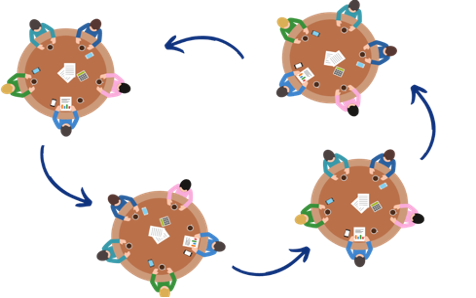Teacher Training & The World Cafe Technique
The Uganda School Project (TUSP) recently held a ‘World Café Technique’ - a participatory teacher training workshop - at Soono Primary School in Namisindwa District, Eastern Uganda. We brought together 21 teachers and headteachers from Soono and Bumakenya Primary Schools, alongside local education officials and community leaders, to co-produce the content of our next phase of context-specific teacher professional development.
Teacher training programmes designed in the Global North often fail in developing countries due to a mismatch between their assumptions (e.g. good infrastructure, small classes, Western pedagogies) and the challenging realities faced by local educators. In rural Ugandan schools, teachers deal with severe classroom overcrowding, shortages of teaching resources, and cultural norms that differ significantly from those assumed by imported training models.
The World Café Technique intentionally centred the voices of local teachers and drew on their lived experiences, professional knowledge, and understanding of their communities to create the most contextualised, practical, and sustainable teacher training programme possible.
How the activity was designed
Ahead of the workshop, teachers completed a questionnaire to select training topics most relevant to their needs. The four most selected topics were:
Managing overcrowded classrooms in Uganda – Teachers in our communities work with classes of over 100 pupils, making it hard to engage all learners, manage discipline, and mark work effectively.
Developing low-cost teaching aids and classroom resources – With limited budgets and shortages of textbooks, teachers are eager to learn how to make effective learning materials from locally available and recyclable resources.
Positive discipline management strategies – With corporal punishment banned in Ugandan schools, teachers wanted practical, culturally sensitive alternatives to maintain order and foster a positive learning environment.
Gender-sensitive and inclusive teaching methods – Teachers are looking for ways to challenge cultural norms that hold girls back and to create equitable classrooms for boys and girls.
How the World Café Technique activity worked
Teachers were grouped according to the year levels they teach and rotated between discussion tables every 30 minutes for each topic. Six trained facilitators or ‘secretaries’ (that included Ugandan education specialists and TUSP staff) guided conversations and recorded key insights, which were then shared in a plenary session. This rotating structure encouraged every teacher to contribute to every topic and created a relaxed atmosphere where they felt open to express themselves. This in turn generated a rich pool of context-specific challenges and practical strategies grounded in real classroom experiences.
Findings
Teachers identified and discussed both the challenges they face and the strategies they find most effective:
For overcrowding, grouping learners and appointing group leaders can improve participation, though it requires careful planning.
For teaching aids, everyday items like banana fibres, bottle tops, or handmade models can bring lessons to life and take concepts from abstract to concrete..
For discipline, approaches such as student-led rulemaking, non-corporal punishments, and reward systems proved effective.
For gender sensitivity, using role models, rewarding performance, and addressing stereotypes directly in class were seen as key.
Conclusion
Teachers gave valuable perspectives, validated & invalidated assumptions, brought new ideas to the table, and most importantly, felt comfortable and relaxed to share their feelings openly, indicating a level of trust we have worked hard to nurture.
By grounding our training design in teachers’ own knowledge, we make it more relevant, sustainable, and impactful. As one participant put it,
“The exercise was so good and there is a need for more exercises to come on board for effective teaching and learning.”
The insights from this WCT activity are now shaping our next teacher training programme, ensuring it addresses the real, context-specific challenges faced by educators in Namisindwa District and builds on strategies they have already identified. This work is part of TUSP’s wider commitment to decolonising development, moving away from ‘top-down’ solutions and towards participatory, locally-led approaches that put teachers, learners, and communities at the centre of their own development.
Click here to support our work improving teaching standards. Your support means everything!

